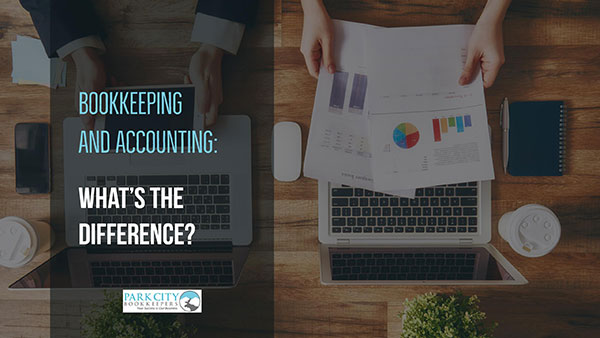Both bookkeeping and accounting are financial activities essential to running any profitable business. The two are closely intertwined, and while many people consider them one and the same, there is a difference between bookkeeping and accounting. Bookkeeping involves the classification and recording of accounting data, and is carried out by bookkeepers or accounting clerks. This data is then used by accountants to create reports, conduct analysis, pay taxes, and perform other essential financial processes. Here are the differences broken down in detail:
#1. Bookkeeping is all about the details, accounting is about the big picture
Financial data is critical to decision making, but where does this data come from? Bookkeeping is the primary source of financial data for every organization. Every single transaction is collected and sorted and recorded, providing decision-makers with processed data (i.e. Information), that can be used to make informed business decisions.
Accounting on the other hand, takes more of a bird’s eye-view, and is not typically concerned with the minute details of each transaction. Instead, accountants (or the accounting department), are focused on the bigger picture and generating reports that are indicative of the company’s financial health.
#2. Accounting branches out into specialized fields
This is one of the major differences between bookkeeping and accounting. The bookkeeping process is a standardized function: bookkeepers in every organization collect evidence of transactions such as receipts and invoices, extract data from them, enter this data into accounts, and sometimes prepare reports for accountants to use.
The field of accounting, on the other hand, is much broader, and contains a number of other sub-fields. For example, there is financial accounting, management accounting, cost accounting, taxation, audit, forensic accounting, etc.
If you need better records and reliable data, then all you need are bookkeeping services. But it is a bit more complicated to determine just what sort of accounting services your business might need. For example, if you are preparing for expansion, you might need management and cost accounting; if you are preparing to sell your business, financial accounting might be more relevant; if you are trying to trace fraud, you will need forensic accounting services; and if you have shareholders you may be more interested in audit services.
#3. Accounting requires specialists
While there are lots of people who take courses to learn bookkeeping, nearly anyone can learn bookkeeping on the job. Usually the minimum entry requirement for bookkeeping is a high school diploma, so if bookkeeping services are all you need, you can easily learn how to do it yourself, train someone else to do it, or purchase a bookkeeping software.
Due to the difference between bookkeeping and accounting, and given the latter’s complexity, you have to hire a professional accountant to get the job done. Not only is it advisable to hire a professional, you will also want to hire an accountant who specializes in the particular area where you need help.
#4. Accounting services may cost more than bookkeeping
Bookkeeping services are generally limited in their scope, and do not require much by way of formal education, the cost is another main difference between bookkeeping and accounting, where the latter costs a lot more due to its specialized nature.
Do you need bookkeeping or accounting services?
Even if you believe you may need help, you might not be sure whether you need a bookkeeper or an accountant. Here are some tips to help you determine:
- You run a small business: If you run a small business with anything from 1-10 employees, you probably do not need any routine accounting services just yet. A good bookkeeper should be able to take care of your needs.
- You have been doing your accounting by yourself: In case you have made a mess of your accounts and need urgent intervention, a good bookkeeper can help you sort your accounts and get you back on track.
- You are about to make major financial decisions: You might need the services of an accountant who will help you analyze your books and give you sound financial advice.
- You face an IRS audit: Bookkeepers and accountants can both handle tax preparation effectively, but to be on the safe side, you may want to consider hiring an accountant with knowledge of the regulations and guidelines that concern your industry.

